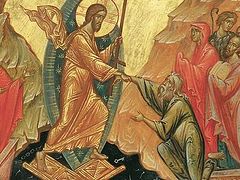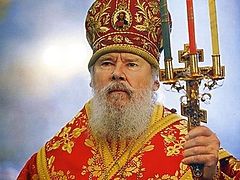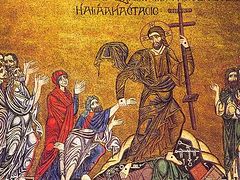Is life worth living? This question was posed by one of the modern philosophers. Now, neither a kangaroo nor a butterfly would ever ask such a question. No living thing would try to comprehend its existence by instinct alone. Yet man has something in him that sets him apart from ordinary things and beings, something that overpoweringly requires him to understand his life.
Yet most people are weak, which is why they go through life without knowing its meaning. Many philosophers in antiquity, having arrived at the notion that their life was not rooted in eternity, wilfully chose to end it. Fortunately, they were always in a minority. Most people are born and live to old age, instinctively shying away from pressing eternal questions. However, the whole drama of Christian life consists in awakening us from slumber. Not in order to lead us to a dead end and suicide, but for a breakthrough into eternal life. This is a very serious matter.
St. John of Kronstadt compared man to a chicken. A chicken is born twice. Initially, the hen goes through the pain of labor and lays an egg. But what is born is not yet a chicken. Now the egg needs to be warmed and hatched. Only after a long period of incubation does a furry, wet, funny yellow living thing hatch from inside a dead shell. Man too must be born twice. At first, like a young frog, like Mowgli, like a human cub; then as a person, as an intelligent human being, as a child of God by grace. Whoever is not born twice will remain an egg. He is destined to be eaten, soft-boiled or hard-boiled; to be eaten raw by a human or an animal. The details are not important. There are many people in that situation.
In the light of what has been said, there is a special beauty in the ritual of the blessing of a decorated egg and in everything that is connected with Easter eggs. As we know, it was an egg that was offered as a gift to Emperor Tiberius by Mary Magdalene. All this is because we are like eggs.
Awakening to a conscious and intelligent life can be compared to a resurrection from the dead. The resurrected Christ manifests His constant presence in our world by the fact that a great many people, having heard His name, having read His word, and having tasted His Mysteries, throw off their burial shroud and, like a butterfly out of a cocoon, flutter upwards to fly about, living a new life. This is the significance of celebrating Christ’s Resurrection. If we do not rise from a malodorous living death, if we do not get up and begin to move about after lying inside a coffin for a long time—whether through carelessness, despondency, or hatred—then our faith is in vain (1 Cor. 15:14).
Christ’s Resurrection justifies human life and at the same time gives meaning to it. Belief in the resurrection stands midway between the teaching that there is no afterlife at all and the doctrine of reincarnation. These attack us on both sides. Some people compare human beings to grass; as soon as anyone is reaped by death, they hasten to deliver them to an annihilating fire as if they had never existed. Others, having a sense of eternity in their hearts but not believing in Christ, will fantasize about their past or future lives as a fish, a mosquitoe, a buffalo, and so on. The merciful Christ saves us from the one danger and does not let us fall into the other. By His unique Incarnation and His equally unique redemptive death and Resurrection, He enables us to understand that we are both eternal and unique.
In His hypostasis Christ assumed the whole of human nature. This means that everyone will be resurrected, those who want it and those who do not; those who know about it, and those who never thought about it. Christ lived one life on earth. He will not become incarnate a second time, he will not be crucified again, he will not be resurrected anymore. This means that we also live one life. We write it as a fair copy; there are no rough drafts.
Having become incarnate and having suffered, Christ earned the right to judge people. As God, He had the power to do so, but people did not consider that He had the right. God is on high and far away, people thought. He is holy and pure. We live here below in filth and sins, and there is nothing in common between us and Him. “Are you able to judge us,” people might well say to the Great God in Heaven, “we who are crawling about in sins like worms?”
Because God is good, this argument is monstrous. But to pull it out like a sting from crafty and flattering human lips, God personally, in His Son, united Himself with human nature, came down to us and became one of us. Before His Resurrection, He was a baby, was breastfed, and cried from hunger. He needed warmth and protection. When He grew up he worked hard, got tired, was frozen, and went hungry. He traveled about on foot. He was scolded by his compatriots and reviled by the scribes; He was betrayed by one disciple and denied by another. He experienced and felt, in our skin, all that could be experienced on earth. He has the right to judge us—not because He is God, but because He is Man.
Now he shall see of the travail of his soul, and shall be satisfied (Is. 53:11). Where two or three are gathered in His name, He promised to remain among them mystically. And He is dwelling among us now, for it is in His name that we are celebrating. As pioneering captain of our salvation (cf. Heb 2:10), He leads us to a land of peace. Herein lie the justification, the comprehension, and the sanctification of our temporary existence.
The entire Church is the continuation throughout history of the fact of the truth of Jesus Christ’s Resurrection from the dead, an everlasting fact and one that, like a ray of light, pierces through across the ages. From this source comes the courage of the martyrs, the wisdom of the saints, the patience of the venerable, and the mercy of the selfless. Every ascetic feat and everything that is holy feeds from this source. Even if we ourselves are not venerable, nor martyrs or saints, we still live and breathe by this single new fact in the life of mankind—even though we might not realize it. Yet it would certainly be beneficial for us if we were aware of it. For, in fact, there is a good reason why the mind as well as the heart is required.




